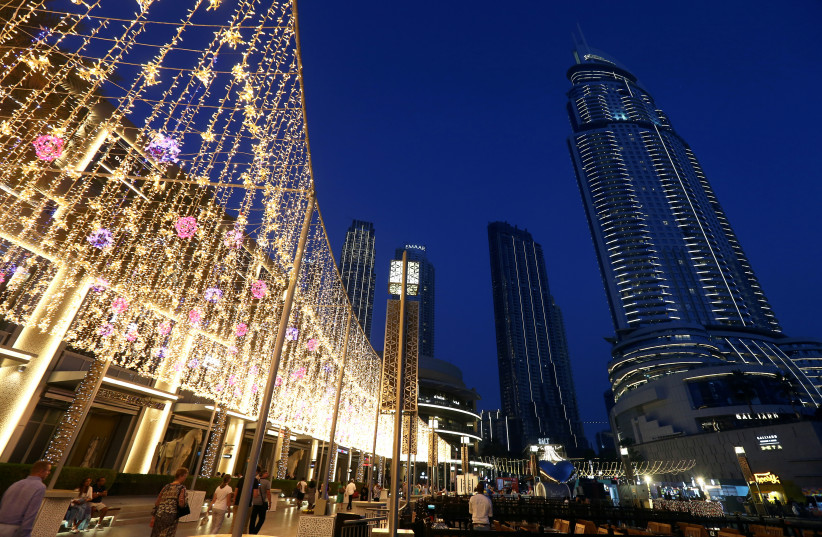Chinese electronic vehicle maker Xpeng gave a public demonstration of its flying car in the United Arab Emirates, as the company works toward the goal of having its electric aircraft take off in international markets. The X2, a two-seater electric vertical take-off and landing (eVTOL) aircraft, lifted itself off last week in Dubai.
For more stories from The Media Line go to themedialine.org
"We are making step-by-step (moves) to the international market," Minguan Qiu, general manager of Xpeng Aeroht, told Reuters. "First we selected Dubai city because Dubai is the most innovative city in the world." A model of the X2 has been on display at the exhibition center in Dubai during GITEX, one of the world's three major technology expos. Prior to its test flight, the X2 had to pass an operations risk assessment in Dubai.

"We are making step-by-step (moves) to the international market."
Minguan Qiu, general manager of Xpeng Aeroht
“We are very excited about the future. A lot of the autonomous technology will have to be commercialized in the future and that puts a burden on us because we have a lot of R&D costs to develop, but also the weakness in the consumer demands and disruption that limited our numbers,” Dr. Brian Gu, vice-chairman and president of Xpeng, said during his panel session on the main stage during GITEX. The trade relationship between the UAE and China is well-established, driven by the fact that the UAE is considered the springboard into the Gulf Cooperation Council. Chinese businesses have thrived from significant megaprojects in the Emirates ranging from EXPO 2020 infrastructure to Etihad Rail. China-UAE non-oil trade rose by 27% in 2021 compared to 2020. China’s exports to the UAE increased by $1.78 billion or 53.2% from July 2021 to $5.12 billion in July 2022, according to the China Briefing from Dezan Shira & Associates.
Peggy Li, CEO and Chinese Communication Specialist for SPS;Affinity - Strategic Partnership Solutions, pointed to all of the major global events showcased in the GCC this quarter, ranging from soccer’s World Cup to a major trade summit. “The GCC is known to have that purchasing power and curiosity for innovation,” Li told The Media
Line. She added that Saudi Arabia’s Public Investment Fund and the establishment of the
kingdom’s Premium Residency Visa will now bring Chinese nationals to Saudi Arabia.
The UAE also has a 10-year residency visa with attractive benefits, known as a Golden Visa, for foreign investors and entrepreneurs, professionals in various fields including technology experts, researchers and even artists, and others.
According to figures published by the Chinese Embassy in the UAE, there are currently 300,000 Chinese nationals residing in the UAE. China has remained among the UAE’s top commercial partners over the last five years, with bilateral investments and trade increasing.
China’s COSCO Shipping Lines Co., the world’s largest container operator, has chosen Khalifa Port in Abu Dhabi, UAE as the base of its Middle East operations. Meanwhile, the UAE also has supported China’s ambitions in the Belt and Road Initiative (BRI); setting up projects such as the Dubai Traders Market, the Yiwu Market UAE, and the China-UAE
Industrial Capacity Cooperation Demonstration Zone with the involvement of Chinese capital and firms.
Technology to build a smart city
The relationship has helped create partnerships with Chinese firms that can grow in high-potential sectors like energy, infrastructure and financial technology. “They need this kind of technology if they need to build a smart city,” said an exhibitor from a Chinese firm at GITEX who was not authorized to talk to the media. Cyril Widdershoven, an international oil-gas market and geopolitical specialist, told The Media Line that there are several reasons why there is an increase in the number of Chinese companies in the UAE, "not only on oil-gas and energy but also increasingly on AI/IT/IOT or manufacturing. It is more or less the same approach China has been taking before with Saudi Arabia, Qatar and Egypt.” “Another major issue underlining this is that Arab Gulf States are increasingly repositioning themselves in the larger geopolitical-geoeconomic power play and shifts,” added Widdershoven.
Like China, the GCC is trying to mitigate its links with Iran, as Tehran's regime appears to be foundering. This means that new, strong friends are needed, not only for export- import but also as a potential list on their port infrastructure investments worldwide. “In the coming months the same will again be seen in Saudi Arabia, as the UAE and
Saudi Arabia are not yet on the string of pearls of reality. It will be very interesting to see whom of the GCC hotshots will be at FII2022 (Future Investment Initiative, set for later this month in Riyadh), and how many Chinese and Russians,” Widdershoven added.
